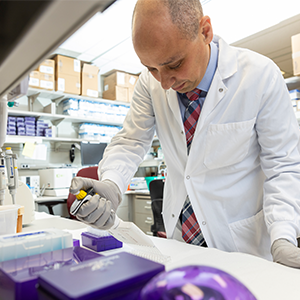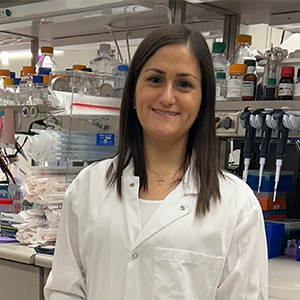-
Science Saturday: Mayo study examines how Latino participants experience genomic medicine
How do people from minority communities experience genomic medicine in diverse health-care settings? How do they integrate genetic knowledge into their understandings of health-care needs?
These answers are critical to researchers as multiple efforts are underway to increase the inclusion of racial minority participants in genomic research and new forms of individualized medicine.
Richard Sharp. Ph.D., director of Mayo Clinic's Bioethics Program and Joel Pacyna, a senior health services analyst, asked these questions while examining Latino participant experiences of genomic screening. They will present their findings, published in Genetics in Medicine, at the Annual Clinical Genetics Meeting on April 13-16.
In a large, multisite genomic sequencing study, researchers compared Latino patients recruited at Mountain Park Health Center, a federally qualified health center in Phoenix, Arizona, and non-Latino patients recruited at Mayo Clinic. Both groups agreed to receive individualized genomic risk assessments.
"Comparisons between cohorts showed that Latino respondents had lower levels of conflict about pursuing genomic screening," says Dr. Sharp. "Latino respondents were more likely to have concerns about the misuse of genomic information, though, despite both groups having similar views about the value of genomic risk evaluation."
According to Pacyna, first author of the study, the findings shine light on broad differences in the psychosocial impact of genomic screening on differentially advantaged populations.
"As genomic medicine expands, continued engagement with racial and ethnic minority populations is critical to ensure that the needs of diverse communities are met in culturally sensitive ways." Pacyna says. "Our data suggest that bioethical concerns that have been studied extensively in more affluent majority populations will need to be re-evaluated in lower resource settings where racial and ethnic minorities often receive care."
Their findings also suggest that interventions that have been created in support of majority populations may not be appropriate or effective in other clinical settings, further widening health disparities and limiting potential benefits of individualized medicine.
"If we fail to develop culturally appropriate forms of genomic medicine, we risk alienating patients who would benefit from these medical advances," says Pacyna.
Need for innovative and tailored approaches to patient education
The researchers are looking ahead to explore whether differences in education level or literacy between the two cohorts may have been associated with observed differences in knowledge and comprehension of genomic screening. Innovative and tailored approaches to patient education (and studies of their effectiveness) may be necessary to support individuals with lower literacy or educational attainment while also addressing some of the cultural conceptions of health and health care that inform understandings of genomic medicine.
This study was a follow-up to the Arizona Return of Actionable Variants Empirical, or RAVE, study, which introduced genomic medicine to Mountain Park Health Center. In this study Researchers from Mayo Clinic and Mountain Park Health Center collaborated to assess the feasibility of offering genomic sequencing in a primary-care setting.
Specifically, 500 Latino adults consented to have their DNA sequenced for a panel of "medically actionable genes." The panel included genes that predispose people to certain diseases such as heart disease, and breast and colon cancers. Findings in these genes are related to health conditions with established medical recommendations or interventions. Then the results were shared with the participants and their providers for follow-up.
Challenges in returning sequencing results were published in a second study in Genetics in Medicine. This study highlighted the intersection of medical advances with social determinants of health, including factors such as the unequal distribution of resources, poverty, access to health care and transportation, housing instability, and health literacy.
“We are pleased that the long-running relationship between Mayo Clinic and Mountain Park Health Center in Phoenix has made it possible for us to jointly study attitudes with regard to genetic testing among Latino patients," says Richard Weinshilboum, M.D., interim director of Mayo Clinic Center for Individualized Medicine. "We want to be able to bring the health care benefits of genetic testing to these patients, but to do so in a way that anticipates and addresses their possible concerns with regard to this rapidly developing aspect of medicine."
The researchers are extending their collaboration with funding from the National Human Genome Research Institute at the National Institutes of Health. They will work on a five-year project with a handful of other institutions across the U.S. through the Electronic Medical Records and Genomics, or eMERGE, Network, an NIH-organized and funded consortium of U.S. medical research institutions.
Future efforts include focusing on the genomic risk of common diseases, including coronary heart disease, diabetes, high blood pressure and colon cancer.
Tune in to the Genetics in Medicine Genepod podcast to hear more from Dr. Sharp and Valentina Hernandez, director of integrated nutrition services and collaborative research for Mountain Park Health Center as they discuss the results of the survey.
Learn more
Read more stories about advances in individualized medicine.
Register to get weekly updates from the Mayo Clinic Center for Individualized Medicine blog.
Join the conversation
For more information on the Mayo Clinic Center for Individualized Medicine, or visit Twitter at @MayoClinicCIM.

Related Articles








